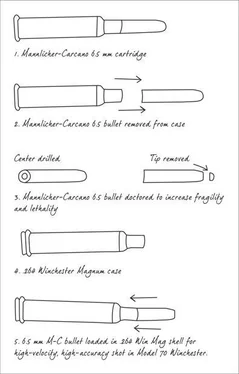Stephen Hunter - The Third Bullet
Здесь есть возможность читать онлайн «Stephen Hunter - The Third Bullet» весь текст электронной книги совершенно бесплатно (целиком полную версию без сокращений). В некоторых случаях можно слушать аудио, скачать через торрент в формате fb2 и присутствует краткое содержание. Жанр: Триллер, на английском языке. Описание произведения, (предисловие) а так же отзывы посетителей доступны на портале библиотеки ЛибКат.
- Название:The Third Bullet
- Автор:
- Жанр:
- Год:неизвестен
- ISBN:нет данных
- Рейтинг книги:5 / 5. Голосов: 1
-
Избранное:Добавить в избранное
- Отзывы:
-
Ваша оценка:
- 100
- 1
- 2
- 3
- 4
- 5
The Third Bullet: краткое содержание, описание и аннотация
Предлагаем к чтению аннотацию, описание, краткое содержание или предисловие (зависит от того, что написал сам автор книги «The Third Bullet»). Если вы не нашли необходимую информацию о книге — напишите в комментариях, мы постараемся отыскать её.
The Third Bullet — читать онлайн бесплатно полную книгу (весь текст) целиком
Ниже представлен текст книги, разбитый по страницам. Система сохранения места последней прочитанной страницы, позволяет с удобством читать онлайн бесплатно книгу «The Third Bullet», без необходимости каждый раз заново искать на чём Вы остановились. Поставьте закладку, и сможете в любой момент перейти на страницу, на которой закончили чтение.
Интервал:
Закладка:
“I don’t really like vodka,” Alek said in English.
“Good,” I answered in Russian. “It was a manner of speaking. I wouldn’t order anything out of the way in a place like this, as one of these men might remember us talking in a foreign language, drinking Stolichnaya. I would also speak in English, but I speak it with a New England accent, and that would probably be more remarkable to them than Russian.”
A sluggard came over, and we ordered Mexican beer. When he brought the frosty cans, the waiter also brought chips and some kind of tasty red sauce. It was my first experience with Mexican food, and I was surprised by how much I enjoyed it.
“Who are you?” Alek said, leaning forward and fixing his beady, suspicious eyes on me.
“You’ll never learn my name. Security.”
“But you’re from–”
“I’m from your friends.”
“You know–”
“I know Hotsy, the police agent who bedevils you. In the Mexico City embassy, I know Kostikov, I know Yatskov. I have talked to the first Russian woman you loved, Ella German. I have spoken to your wife’s former lover Anatoly Shpanko. I have talked to your wife’s uncle, Ilya Prusakov, the MVD colonel. I have discussed you with your comrades in the Minsk electrical appliance facility. I will say that all of them have one thing in common: they have a very low opinion of you, Comrade.”
I took a slow draft of the beer, enjoying it immensely, watching a whole dictionary of emotions flash Across alek’s dim little face: anger at being reminded of his mediocrity, his many failures; defensiveness, as he tried to quickly construct his battlements against the truth; fear that someone was here for him; pleasure that he had been noticed at last by what he perceived as the Apparatus; bliss that someone, somewhere, somehow thought he was special.
Finally, he said, “I made mistakes, but only of trying too hard. I believe too hard. It makes some people hate me.”
“It seems they all hate you.”
“They resent me. People always resent me.”
“Do you know the term ‘projection,’ from psychology?”
“No. But I’ve studied Marx, I’ve studied–”
“You’ve studied everything but yourself, which is why nobody cares for you, Alek.”
He looked gloomily into the distance. An actual tear may have formed in one of his eyes. He started to speak, but I cut him off.
“In the whole world, nobody believes in you. To all you are negligible, a failure, a man without a past or future. You beat your pregnant wife and terrify your dear little baby daughter, Junie, you are the shame and scandal of the Russian-speaking community in Dallas. You go to the Cuban embassy and they throw you out, and you go to the Soviet embassy, pull a gun, break down sobbing, and they throw you out. No one in the world believes in you, Alek. Oh, wait. I just remembered. There is a man, probably a fool, who thinks you might amount to something, who thinks you can be saved.”
“Who?” Alek asked.
“Me,” I said.
I had a few more of the chips with the tangy red sauce. Delicious! I loved the crunchiness of the chips, with a vigorous salty aftertaste, subsumed in the fiery yet not unsubtle blast of the sauce, clearly by color tomato-based, yet not sweet, like so many tomato derivatives, the whole thing suddenly going nuclear to the taste when the pepper component detonated, then ameliorated by the tidal thunder of the cold, cold beer. A fellow could get used to such a thing.
I looked back at Alek. “Say, these chips are swell. I don’t believe I’ve ever had Mexican before. Why don’t we order some dinner? Go ahead, you’re the expert. Call him over and order for us. I think I’d like another beer, please.” I held up my empty can. It was called Tecate and had a lime slice wedged into the opener puncture. Why had I never tasted this before? It seemed not to have made it to Georgetown yet. I made up my mind to search out a Mexican restaurant in D.C. and take Peggy and the boys. That would be an adventure.
Alek waved the waiter over and ordered something from memory; as we waited for the food, I made small talk.
“So, tell me, when did you begin to notice that socialism in reality was considerably different than socialism in theory, and that working on an assembly line anywhere in the world is pretty much the same?”
He wouldn’t engage for a few seconds but then lurched on sullenly. “It wasn’t the work. It wasn’t the guys, they were okay guys. Some of them liked me. I just start thinking about reality and lose my concentration.”
“You messed up. That’s all it was.”
“No. I had big thoughts. I just couldn’t get them out. But somehow–”
“Your type will always locate a ‘somehow.’ Somehow this, somehow that, it’s never your fault, somehow it’s always someone else’s fault. Maybe you should for once in your life forget about somehow and concentrate on one thing, do it well, thoroughly, completely, and not give a shit about what happens somehow to you. Then, if you know you did your best, possibly soon enough they will know, and there will be no somehow.”
He brought out the Dale carnegie in me.
“I tried to, I tried to,” he protested.
Thankfully, the food came – thinking about it now, I realize it was enchiladas, rice and beans, and a taco on the side – and we were spared more chatter as we put it down with another beer. Again, it was a good meal, and I was happy, for the rest of my life, to enjoy Mexican whenever the chance arose. That much I owe Lee Harvey Oswald.
We finished without much chatter, and I paid, and out we went to the car. It was dark now, and twenty minutes had passed since we had spoken. His face was knit tight, I guessed partly in fear of saying something stupid, partly in confusion. He could not meet my eyes.
When the car doors were closed and I’d pulled out into traffic, I finally said, “Alek, you know how it works, don’t you?”
“Sir?” he said in English.
“That is, the organization I represent.”
“I suppose so. You find people who–”
“No, no, not the idealized, the propagandized, version. I mean the reality. That reality is that it’s a big organization and it has many subunits, many departments, many cells, all of them driven by ego, fear, ignorance, full of average men attempting to curry favor with supervisors, attempting to be supervisors, out of nothing more than petty ambition. Some work at cross-purposes to others, some work at purposes that have no relationship whatsoever to the purposes others work to accomplish, and the communication between them is at all times inefficient, even weak.”
“Yes sir,” he said.
“Kostikov and Yatskov, for example, they’re in a division that is charged with servicing and monitoring our embassies abroad. They watch for spies, they try to recruit spies, they also have responsibilities for vetting defectors, dealing with walk-ins, this and that. Their hope is to get through thirty-five years without making a bad mistake or offending a superior; if they accomplish that, they get a medal, a nice but hardly remunerative stipend, and possibly a small dacha outside Moscow in one of the less fashionable districts. If so, they can consider themselves heroes and successes, you see?”
“I do.”
“To them, you are simply a problem they do not care to deal with. Imagination is not their strong suit. Career-wise for them – and there is no other concern – it’s best you go away fast and forever and not upset or reroute the Kostikov Express to a dacha.”
“Yes sir.”
“But I’m in a different department. When news reaches me of the crazy American who says he took a shot at General Walker, I’m not annoyed, I’m fascinated. I have to learn more. My department has use for people like the crazy American; we’re charged with actually accomplishing something, not merely maintaining a security perimeter.”
Читать дальшеИнтервал:
Закладка:
Похожие книги на «The Third Bullet»
Представляем Вашему вниманию похожие книги на «The Third Bullet» списком для выбора. Мы отобрали схожую по названию и смыслу литературу в надежде предоставить читателям больше вариантов отыскать новые, интересные, ещё непрочитанные произведения.
Обсуждение, отзывы о книге «The Third Bullet» и просто собственные мнения читателей. Оставьте ваши комментарии, напишите, что Вы думаете о произведении, его смысле или главных героях. Укажите что конкретно понравилось, а что нет, и почему Вы так считаете.












